Much-maligned interinstitutional agreement on a mandatory transparency register soon to be published in the Official Journal.

On 6 May, the Council officially adopted a package of rules governing the transparency and access of lobbyists to its institution. Since the European Parliament had already done so in April, this act paves the way for the official signing, on 20 May, of the interinstitutional agreement (IIA) negotiated by the European Parliament, the Council and the Commission last December. The IIA’s publication in the EU’s Official Journal in July will mark the successful end of the decision-making process.
Fulfilling a long-cherished wish of the Commission, the conclusion of the IIA represents the first time that all of the Union’s three central institutions agree to be bound by the same framework governing disclosure obligations and rules of engagement, including access to premises and decision makers, of non-elected interest representatives. However, the negotiated deal was also criticised by academics and civil society for narrowing its scope of application to the point of obsolescence. The new rules do not cover interactions between MEPs and Permanent Representations of the Member States and lobbyists, prompting a researcher to remark that the IIA “stretches the definition of mandatory beyond normal uses of the word”.

See also
Some MEPs, such as Sophie in ‘t Veld (Renew) and Rainer Wieland (EPP) however have openly pushed back against the notion of being compelled to disclose their contacts with lobbyists, suggesting such an obligation would be “undemocratic” and would undermine their freedom of mandate.
Meanwhile, member state representatives have disowned the issue, arguing that the inclusion of their Brussels delegations would be impossible as they are protected by diplomatic inviolability under the Vienna Convention. In the meanwhile, disclosure of lobby contacts with the ambassador of the member state holding the rotating Presidency has become the norm, while various delegations have voluntarily signed on to some form of lobby disclosure.
The IIA on a mandatory transparency register marks the latest incarnation of a decade-long interinstitutional saga in which the institutions have taken each other to task over allegedly unacceptable proximity to invisible interests.


